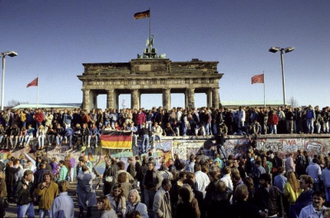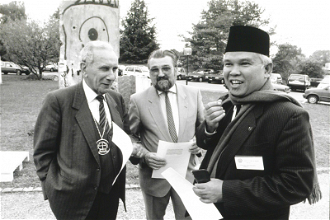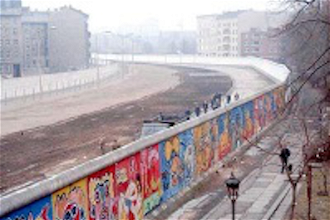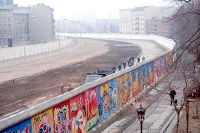EU Bishops statement on 30th anniversary of fall of Berlin Wall

On the occasion of the 30th anniversary of the fall of the Berlin Wall, EU Bishops call upon all Europeans to work together towards a free and united Europe "through a renewed process of dialogue […] for a common peaceful future". COMECE Vice-President HE Mgr Overbeck (Germany): "it is a call on the European people to cooperate in solidarity."
This statement was adopted by the Assembly of COMECE - composed of the Bishop-Delegates of the Episcopates of the European Union - held in Brussels on 23-25 October 2019 under the chairmanship of Cardnial Jean-Claude Hollerich SJ, President of COMECE.
The fall of the Berlin Wall, on 9 November 1989, marked "one of the most important events in European history", state the Bishops. This event was guided by hope and expectations for a better future, allowing Europe to finally "breath with two lungs" - East and West - and to deepen its own integration process.
In their statement, the Bishops of the EU highlight the prophetic dimension of the fall of the Berlin Wall. It is not only an event of the past to be celebrated, but a great lesson for the entire humanity: "constructing walls between people is never the solution".
"In times of strengthened nationalisms - says HE Mgr Franz-Josef Overbeck, Vice-President of COMECE - the fall of the Berlin Wall reminds us vividly, and not only the Germans, of the value of liberty, and of the EU's significance as a project of peace".
The Bishops of the EU encourage "all Europeans to work together towards and united Europe through a renewed process of dialogue... for a common peaceful future" and invite all to renew the commitment to those principles on which Europe is built: justice, liberty and peace.
Read the full statement of the Bishops of the Commission of the Episcopates of the European Union (COMECE) on the occasion of the 30th Anniversary of the Fall of the Berlin Wall here:
The fall of the Berlin Wall on the 9th of November 1989 was one of the most important events in European history of the last decades. It was a moment full of emotion. After having been separated by a concrete wall for more than 28 years, people - relatives, friends and neighbours - living in the same city were able to meet each other, to celebrate and to express their joy and hopes. From this moment on the world looked different.
This wall was a symbol of the ideological division of Europe and of the whole world. The changes that took place in Hungary in the beginning of 1989, the collapse of the Iron Curtain in April and the first free elections in Poland in June culminated in the fall of the Berlin Wall, an event that opened the way for regaining freedom after more than 40 years of oppressive regimes in Central and Eastern European countries. These efforts owed their success to the commitment of a great number of Europeans expressing constantly but peacefully their deep yearning for political change.
It is true that not all the expectations that the fall of the Wall brought forth have been fulfilled. It is also true that the ideologies that were behind the building of the Wall have not fully disappeared in Europe and are still present today in different forms. We also acknowledge as Christians that it is Christ who "is our peace, who has made the two groups one and has destroyed the barrier, the dividing wall of hostility" (Ephesians 2 14). The fall of the Berlin Wall is not only an event of the past to be celebrated but has a prophetic dimension. It has taught us that constructing walls between people is never the solution and it is a call to work for a better and more integrated Europe.
We should remember the important role of Saint John Paul II and his encouragement: "Europe needs to breathe with two lungs!"
We acknowledge that the process of healing and reconciliation is delicate and difficult. Even today, for some of the victims of the oppressive regimes of the past this process is far from completed; their determination, commitment and suffering were decisive for the freedom Europe enjoys today.
Yet, we want to revive and foster those signs of hope, those expectations for a better future in Europe and for all Europeans that guided that historic moment in November 1989.
For this reason, as Christians and European citizens, we call upon all Europeans to work together towards a free and united Europe through a renewed process of dialogue across mentalities and cultures, respecting our different experiences of history and sharing our hopes and expectations for a common peaceful future. To be able to succeed we need to remember that a culture of encounter implies the genuine capacity to listen first. As Christians we are also called to preach and be witnesses of the Gospel, knowing that "only in the mystery of the incarnate Word does the mystery of man take on light" (Gaudium et Spes, 22).
We invite all to pray to God, the Lord of History, that He might help us to devote ourselves to a Europe moved by Holy Spirit, who is the root and foundation of hope and the source and power of a new commitment to those values Europe is built upon: justice, liberty and peace.
Approved by:
Jean-Claude Hollerich SJ, Cardinal Archbishop of Luxembourg, President Mariano Crociata, Bishop of Latina (Italy), First Vice-President Franz-Josef Overbeck, Bishop of Essen (Germany), Vice-President Noel Treanor, Bishop of Down & Connor (Ireland), Vice-President Jan Vokal, Bishop of Hradec Kralove (Czech Republic), Vice-President Virgil Bercea, Bishop of Oradea Mare (Romania) Ferenc Cserhati, Auxiliary Bishop of Esztergom-Budapest (Hungary) Jorge Ferreira da Costa Ortiga, Archbishop of Braga (Portugal) Hugh Gilbert, Bishop of Aberdeen (Scotland) Adolfo González Montes, Bishop of Almeria (Spain) Joseph Galea-Curmi, Auxiliary Bishop of Malta Jozef Halko, Auxiliary Bishop of Bratislava (Slovakia) Antoine Herouard, Auxiliary Bishop of Lille (France) Theodorus CM Hoogenboom, Auxiliary Bishop of Utrecht (The Netherlands) Nicholas Hudson, Auxiliary Bishop of Westminster (England & Wales) Vjekoslav Huzjak, Bishop of Bjelovar-Krizevci (Croatia) Philippe Jourdan, Apostolic Administrator of Estonia Jean Kockerols, Auxiliary Bishop of Malines-Brussels (Belgium) Czeslaw Kozon, Bishop of Copenhagen (Scandinavia) Manuel Nin i Guell OSB, Apostolic Exarch of Greece Rimantas Norvila, Bishop of Vilkaviskis (Lithuania) Christo Proykov, Bishop of Saint John XXIII of Sofia (Bulgaria) Youssef Soueif, Maronite Archbishop of Cyprus Zbignev Stankevics, Archbishop of Riga (Latvia) Janusz Bogusław Stepnowski, Bishop of Lomza (Poland) Franc Sustar, Auxiliary Bishop of Ljubljana (Slovenia) Agidius J Zsifkovics, Bishop of Eisenstadt (Austria)


















